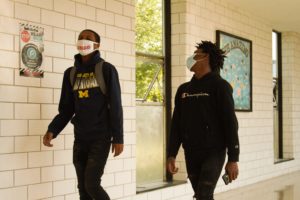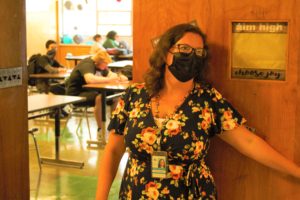By Harold C. Ford
Students enrolled in Flint Community Schools (FCS) returned to school Aug. 4 for a third consecutive year under a “balanced calendar” that was adopted by FCS at the start of the 2019-2020 school year.
A balanced calendar features an earlier start to the school year, a later finish, and longer and more frequent breaks during the academic year. While balanced calendar proponents cite many advantages, the most frequently-touted benefit is the diminishment of learning loss—particularly for low-income youth.

Southwestern Academy students fill the hallways in between classes on FCS’ opening day, Monday, August 4. (Photo by Tom Travis)
Josha Talison, former superintendent of Beecher Schools, the first public school district in Michigan to adopt a balanced calendar in the 2013-14 school year, told East Village Magazine (EVM), “I think the balanced calendar aids in the elimination of summer learning loss for students in rural and inner-city environments.”
A balanced calendar was advocated by a Michigan Department of Education report in 2016 “to reduce the impact of high-risk factors, including poverty, and provide equitable resources to meet the needs of all students …”
The number of school districts converting to a balanced calendar is growing nationally as reported by Education Week and in Michigan as reported by the Detroit Free Press.
Low test scores
Low standardized test scores belie efforts by FCS to instill confidence in its efforts to upgrade the academic profile of its student population. Test scores for FCS students lagged significantly behind “similar students” and state averages according to data released by the Michigan Department of Education for the 2018-2019 school year.

Doyle-Ryder 1st grade teacher Kim Montini speaks to her class on on the first day of school. The students sit at their desks eating breakfast which is provided by the school every morning. Montini has taught on the FCS district for 26 years and taught at Doyle-Ryder for five years. (Photo by Tom Travis)
The 2018-19 test scores, as reported by EVM, included the Michigan Student Test of Educational Progress (M-STEP) for grades 3-7, the Preliminary Scholastic Aptitude Test (PSAT) for 8th graders, and the Scholastic Aptitude Test (SAT) for 11th graders.
Summer programming
Summer and after-school programming also represent an effort by school districts to improve the academic standing of its students and advance social skills. FCS summer programming has been supported by funding from the C.S. Mott Foundation that is routed to and through the Crim Fitness Foundation and the Genesee Area Focus Fund.
Summer school architect Kelly Fields
FCS building administrator Kelly Fields is one of the architects of FCS summer programming that just concluded. EVM interviewed Fields July 22 just as summer programming was concluding and the regular school year was about to begin.
Fields, principal at FCS’ Accelerated Learning Academy (ALA), ‘helped facilitate the planning … and (oversaw) the implementation of it.” She graduated from Flint Northern High School, Mott Community College, and Ferris State University. She earned an education specialist degree from the University of Michigan-Flint.

Southwestern Academy students making their way to their next class on the first day of school 2021. (Photo by Tom Travis)
Fields taught English, then transitioned to the position of reading interventionist, and is embarking upon her fifth year in building administration.
“It was teachers that paved the way for me to be an educator,” Fields said. “It was educators that kind of took care of me when I was younger, and I felt like it was something I needed to pay forward.”
Fields agreed that a career as an educator is filled with challenges and rewards. “There is no better way to use my talents … to serve my city and my community,” she said. “The challenges I look at as opportunities for my own growth as a practitioner.”
FCS’ public relations firm, Lambert & Co., arranged the interview with Fields. Lambert has Michigan offices in Grand Rapids, Lansing, and Detroit. Fields’ answers have been lightly edited for clarity and brevity.
EVM: Approximately, how many FCS students (of about 3,000) are enrolled in summer programming?
KF: (Fields could only speak about secondary enrollment, 9th-12th grades, not elementary.) “We had 176 kids that were enrolled.”
EVM: Summer programs last how many weeks?
KF: “It’s been a four-week program.”
EVM: What types of programs are offered?

A masked student walks into their first day of school at Doyle-Ryder School. (Photo by Tom Travis)
KF: “For 9th-12th graders it’s credit recovery … 90 kids (recovered) 151 credits … and those numbers are just going to rise …”
EVM: How much of FCS summer programming is provided by YouthQuest and the Crim Fitness Foundation?
KF: “Youth Quest is currently doing programming with about 40 students offering driver training … for secondary, Crim is not part of summer programming.”
EVM: Would you agree that summer programming—in addition to the balanced calendar—should help prevent learning loss, boost academic and/or social skills, and help retain students?
KF: “Yes.”
EVM: If you agree with the assumptions in the preceding question, do you have any supporting data?
KF: “Until after the summer session is completed and we have assessments to reflect those trends, I wouldn’t be able to respond to that question.” (EVM was referred to FCS central administration for a more detailed response.)
EVM: About social skills, do you have data showing a decrease in FCS student discipline (as required by the state-mandated school improvement plan), including suspensions and expulsions, as a result of summer programming?
KF: (Fields chose to provide an anecdotal answer and referred EVM to central administration for a more detailed response.) “We have not only family engagement attendance agents, but social workers, behavior specialists (all members of the FCS Wellness Team).

Southwestern Academy 10th grade English teacher Ms. Krueger holds the door open and greets students as they file into her classroom. Krueger is a second year teacher and was previously a social worker. (Photo by Tom Travis)
“We have all of those individuals working to support students this summer. The initiative was to support students with pandemic-related trauma, support students in coming back to face-to-face instruction.” Fields recalled only one “serious” incident of student misbehavior during the four-week summer sessions with 176 students. “I’m certainly pleased with that,” remarked Fields.
EVM: About student retention: An auditing firm just presented information to the FCS board showing a decline in student population from about 23,000 to about 3,000 in the past two decades (2002-03 to 2020-21) and that 78 percent of students living in Flint do not attend Flint schools. Do you have data showing that summer programming has made an appreciable difference in student retention?
KF: (EVM was referred to central administration for data.) “Just from ALA … I’ve actually increased enrollment for my school this year … Our numbers have increased … I’m pretty happy with that … A lot of those students are students that earned credit this summer …”
EVM: Less than 60 FCS students graduated from high school this year. Has summer programming contributed in any way to this number of graduates?
KF: “No, I don’t think summer school has. The class size that we graduated this past year, I believe that there are many more factors that play into our smaller graduation sizes and I don’t think it’s a fair assumption to say that Flint Community Schools really contributes to that. I think there are a lot of factors …”
EVM: If there was no summer programming would that graduation number be even lower?
KF: “Yes, I do believe that summer school has contributed to us having a higher number (of graduates). I do know that for sure.” Fields noted that in a recent year, three of six seniors graduated from ALA; then eight of 16 the following year; there are 18 projected graduates at the end of the current 2021-22 school year. ‘My goal is to get every last one of those kiddos (graduated).”
EVM: Is summer programming less essential now that FCS is on a balanced calendar that reduces summer vacation to a few weeks and provides longer breaks, intersessions, during the school year? Shouldn’t some resources be shifted from summer programming to programming during FCS intersessions?

Doyle-Ryder Reading Specialist Shari Burdt enthusiastically greets students as they file into the gynamsium to learn their room assignements. Burdt has taught for 49 years and has been at Doyle-Ryder for 10 years.
KF: “Summer school and intersession(s) are the opportunity for us to build off of the strengths of the credit recovery programming and the opportunity to support students (to) matriculate the credits they need to graduate. You have to be very intentional about the programming. It’s an opportunity for kids to capitalize on those time periods. This next year, we’re looking to utilize intersessions … for the opportunity for kids to test out of a credit … a fantastic opportunity.”
EVM: Would you agree that CS Mott Foundation funding of YouthQuest is critical to delivery of summer programming to Flint students?
KF: EVM was referred to central administration for a reply.
EVM: What’s going to happen to summer programming with the announcement by C. S. Mott that they’re going to pause funding (restored by the time of this report) for this kind of programming?
KF: EVM was referred to central administration for a reply.
EVM: You obviously believe that summer programming is important to your students. As a representative of FCS, do you have an explanation for citizens, for parents of your scholars, about what led to the pause of funding by C. S. Mott?
KF: EVM was referred to central administration for a reply.
EVM: Are you confident that FCS will provide summer programming next summer?
KF: “Oh yeah.” Fields was confident that such programming would be provided every year. “It’s part of our initiative to make sure we provide kids every opportunity … I’m confident that we’ll have summer school provided by Flint Community Schools.”
EVM: What are the requirements to work in FCS summer programming? Can you assure parents that all summer program employees who work with their children in summer programs are qualified for their positions?
KF: “Highly qualified teachers are provided for specific content area(s) and our support staff is support staff that is utilized throughout our school year and is appropriately certified and/or earmarked for those particular jobs … (such as behavior specialists).
EVM: FCS has adopted a program where college graduates without a teaching certification can be hired as classroom teachers while obtaining certification. Are some of those persons working in FCS summer programming?
KF: “The staffing I’m familiar with for post-secondary, they have all been highly qualified teachers that are certified by the State of Michigan in their content area. We have no uncertified teachers that are teaching right now.”
EVM: Why is it that a PR firm based in another city in the state arranged this interview? Can’t there be a more direct relationship between FCS officials and local journalists that doesn’t involve the expense of a firm paid by a cash-strapped public school district?
KF: EVM was referred to central administration for a reply.
EVM: A lawsuit was brought against FCS during a summer program when a security officer handcuffed an elementary student. Have the requirements for security been upgraded? If so, can you be specific?
KF: EVM was referred to central administration for a response.
EVM: What would you like to add that hasn’t been asked?
KF: “Summer school is always my favorite time to work … It’s kind of magical. Kids show up for summer school, they know that this is an opportunity to capitalize on a very special opportunity. They usually show up at their very best … behaviorally (and) academically … In years past … we have had the majority of our students usually pass their classes with an A or B (grade) … They come in, they work hard, they do every single assignment …
“It is the norm for summer school that you do not have a lot of behavioral problems … The phenomenon is so strange to me that it happens like that … There are some really special opportunities for kids to learn about who they are as scholars and learners as well.
“Fields reminisced about a poetry class she taught during summer that included a spoken word unit where students engaged “in such a creative and fascinating way … they would flex their skills as lyricists … Poetry is a catharsis and it’s an opportunity for them to heal.”
“She recollected one former student that evolved into an adult mentor/coach that sent Fields a photo of his summer school poetry journal from some six years ago that had inspired him by “healing through art …”
Kelly Fields, FCS principal, co-creator of summer programming
EVM Education Beat reporter Harold Ford can be reached at hcford1185@gmail.com.


You must be logged in to post a comment.